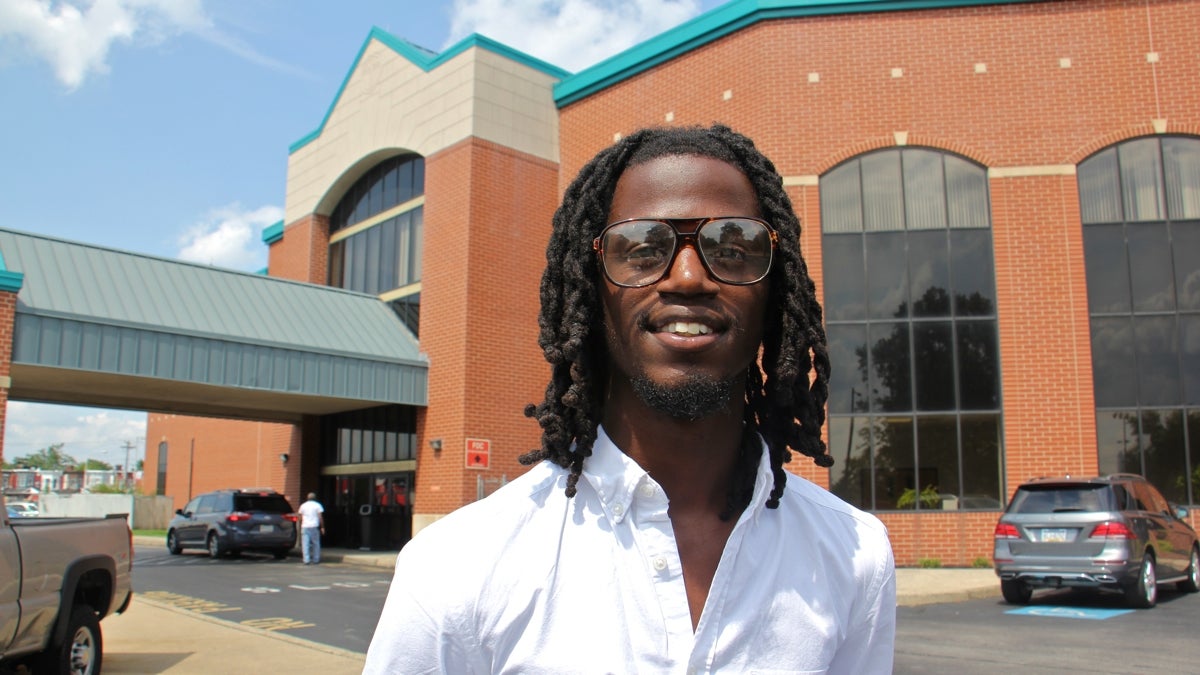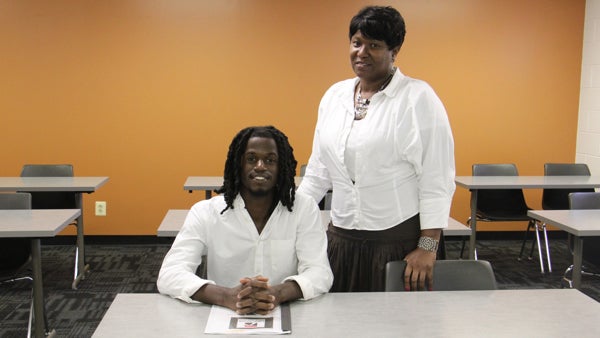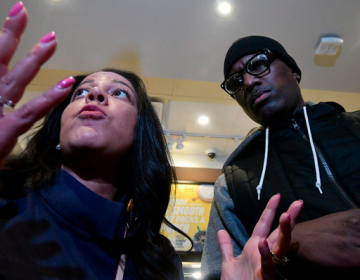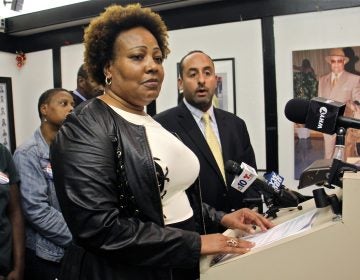Running while black? In Abington, minor case sparks major debate over racial profiling
“They were looking to target a black male, and they didn’t care if they had the right one or not,” said Asa Khalif, an organizer for Black Lives Matter.

Elijah Clay stands outside the Deliverance Evangelistic Church in North Philadelphia, where he works and studies theology. (Emma Lee/WHYY)
Elijah Clay is a man who sees God’s hand in almost everything.
Like the first time his parents met each other decades ago: “She was praying for a man. God told her to point, and as she was pointing somewhere (at Clay’s father), He said: ‘That’s your husband.’”
Or when he got a job offer within minutes of his father’s death last fall: “God looked at it and said, ‘You can be man of the house now.’”
Still, when police in Abington, Montgomery County, cited him as the hit-and-run driver who wrecked a stolen Maserati last month in Roslyn, Clay didn’t immediately see what God was up to.
Clay, 20, admits he was near the crash scene that night, visiting his girlfriend, who lives nearby. But he insists he had nothing to do with causing the 2 a.m. collision. He was only there, he said, because he heard it and sprinted there to see if anyone was injured and needed help.
Instead, he found himself sitting in a police car with his hands cuffed behind his back, after officers said two eyewitnesses identified him as the law-breaking, dreadlocked driver.
He now faces a trial on Sept. 8 for reckless driving, careless driving, driving at an unsafe speed, disorderly conduct, and failure to give information and render aid.
“One thing about God, He won’t put you in a situation you can’t handle,” said Clay, who plans to be a minister and is in his second year at Lancaster Bible College. “So I believe God put me in a situation I can handle.”
Now, as Clay mulls the meaning of the situation, a small army of supporters is mobilizing to help him handle it.
A college official said the school will stand with him in court. Black Lives Matter activists plan to attend too, and have connected Clay with an attorney who has pledged to represent him for free. And a neighbor who lives near the crash scene said she’ll testify in his defense.
“He is a church boy,” said Tanya Solomon, a Lancaster Bible College arts and sciences professor who taught Clay last year. “Anyone who knows Elijah knows that he’s quiet, he’s thoughtful, he’s sweet. He is very focused on the ministry. To hear that he’s even being accused of stealing a car and then driving it recklessly, it just does not jibe with the person that I know.”

The charges against Clay are summary offenses, the least serious of crimes. As such, the worst he’ll likely face, if convicted, is fines.
But Clay and his supporters see the case as racial profiling. Clay’s charges resulted from a slapdash investigation, they claim, given that Roslyn, where the crash occurred, is a diverse neighborhood and dreadlocks are a common hairstyle.
“They were looking to target a black male, and they didn’t care if they had the right one or not,” said Asa Khalif, an organizer for Black Lives Matter. “Unfortunately Elijah fit the bill. He was young, he was black, he was male.”
Solomon agreed: “If he’s visiting a friend, he should be able to walk in the neighborhood and not be accused of doing something just because he looks like somebody else. You just don’t see that happening with young white men. I think that God is using this situation to shine light on the issue. And what better person to show that not all black boys are criminals, not all black men are out there looking to steal people’s property and cause mayhem?”
Miriam O’Leary, 68, who lives about a block from the scene, said she hurried outside and saw Clay running toward the wreck just one minute after the loud crash jolted her awake.
“He said to me: ‘Did you hear that?’ And I said yes,” O’Leary said. “I thought he was going to help … I think they (police) said: ‘Oh, eyewitness, boom, done.’ I think they think it’s an open-and-shut case. It’s not. I think they have the wrong person. And that’s what I’ll tell the judge.”
But Abington Deputy Chief Patrick Molloy said he’s confident his department has the right suspects.
Two unrelated witnesses – another neighbor awoken by the crash and a passing motorist – told officers Clay was behind the wheel, with Hakeem Williams, 26, in the passenger seat, when the July 30 crash occurred, Molloy said. The neighbor told police the two men cursed at him and ordered him to go back inside when he approached the wreckage, Molloy added.
While eyewitness identification can frequently be wrong, Molloy noted that “the totality of the circumstances” – including Clay’s proximity to the scene, clothing found in the car linked to Williams, and “other evidence and statements they may have gathered” – led officers to charge the pair.
“It looks like this is a routine, slam-dunk case,” Molloy said.
Still, he’s so concerned about the allegations of racial profiling that he notified the Willow Grove chapter of the NAACP, as his department does whenever bias accusations arise. Leaders of the civil-rights group and police department signed cooperation agreements in 1998 and again last January in an effort to reduce racially biased policing.
If this all sounds like a big brouhaha over a bunch of traffic tickets, both sides say the dispute highlights bigger issues.
“The reality today is we deal with complaints of racial profiling more frequently,” Molloy said. “It’s a cause for concern, because we don’t want to violate anyone’s rights based on race – or anything else.”
And Abington police work hard to avoid bias in policing, participating in youth mentoring, programs aimed at reducing “disproportionate minority contact,” and other outreach intended to improve police relationships with people of color, Molloy said.
For Clay, the case marks the first time he’s ever been charged with a crime.
Living in North Philadelphia, he knows plenty of people with troubled childhoods. In high school, he wrote a paper about what drives students to drop out and launched a business selling inspirational T-shirts with the slogan “Humble Warrior” as part of that senior project. He’s now working on a documentary he calls “The Black Man’s Mindset.” He’s also an amateur boxer.
In between those projects and his ministry studies, he works at Deliverance Evangelistic Church in North Philadelphia, where his late father was a deacon.
His troubles in Abington aren’t just an inconvenience that could potentially cost him thousands of dollars in fines and a tainted reputation.
Instead, he said, it’s God’s way of opening his eyes to racism.
“I think God is trying to show me this is the real world. This is how life is,” Clay said. “For me to actually see racism repeat itself all over and over and over – but for the first time in my life to actually experience it – I’m like wow! I see what He’s doing. God makes leaders. I see that he’s trying to make me a better leader. There’s a purpose behind it. So I’m going to just give it to God at the end of the day.”
WHYY is your source for fact-based, in-depth journalism and information. As a nonprofit organization, we rely on financial support from readers like you. Please give today.



